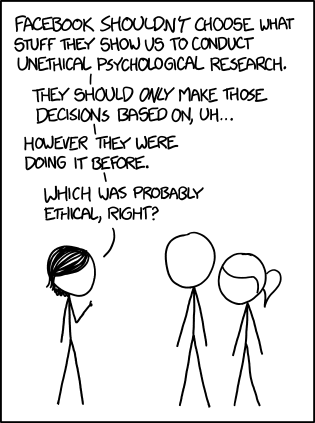David Harlow of the HealthBlawg asks some tough questions over on LinkedIn about data security in healthcare in the wake of the news of the massive data breach at Community Health Systems.
In an op-ed in the New York Times this week called Let’s Not Talk About Sex, Paul Offitt says 2,000 adults will die every year because their parents didn’t have them vaccinated against HPV as kids and calls out doctors for failing to point out that the vaccine is about preventing cancer (and not sex).
An item on from Sunday that is included in NPR’s Shots section, When Patients Read What Their Doctor’s Write, discusses the benefits and limits of open notes and medical records.
 As this comic ‘Research Ethics’ from
As this comic ‘Research Ethics’ from